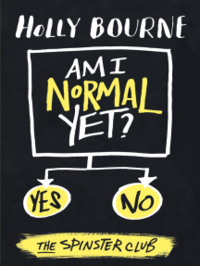Take a photo of a barcode or cover
dark
emotional
funny
hopeful
reflective
sad
tense
medium-paced
Plot or Character Driven:
A mix
Strong character development:
Yes
Loveable characters:
Yes
Diverse cast of characters:
No
Flaws of characters a main focus:
Yes
An excellent portrayal of a girl fighting against OCD, a much misunderstood mental illness. I liked the fact that it used Evie’s Bad Thoughts throughout the text, and how they escalated was representative of how the illness strikes. At the beginning she is much better at counteracting her bad thoughts with good thoughts. Her ritual behaviour is linked closely to her bad thoughts, the kind of behaviour that defines OCD.
Evie sees normal as having a boyfriend, so this becomes her top priority. She even starts to believe she is cured when she’s around someone special, despite the warnings from her therapist. It’s such a normal thing to want when you’re a teenager; to be just like everyone else. It’s only when you’re older and wiser (or Evie’s fab little sister Rose) that you realise there’s no such thing as normal.
The stigma of mental illness causes Evie to be scared to open up to her friends. In her eyes it makes her less normal and she just wanted to be accepted. She doesn’t want pity and she doesn’t want to be seen as a freak. It also shows how being stuck inside your head with your thoughts can make you act selfish, even if you’re not a selfish person. There’s too much else going on to stop and think that other people might be struggling too. That’s an important lesson to anyone who wants to help their friends in similar circumstances; give them time and they’ll be thankful for your patience. It highlights the importance of family and friends in recovery, about being open and not keeping secrets.
I liked Sarah. I thought she was a down to earth therapist, where so many mental health professionals are portrayed in a stereotypical manner. She was firm but kind and had some great “homework” for Evie.
Whilst educating teens on the subject of feminism is an applaudable thing to do through fiction, there were times I thought the lessons were a bit of an info dump. I loved the scene when they realise their conversations aren’t going to pass the Bechdel test and there are other lessons learned which do fit with the narrative, even if a little bit forced.
As for Evie’s presentation at the end, I think it’s a little unfair to blame women’s mental illnesses on men. There’s a tiny concession to the fact that men with depression are more likely to commit suicide, often attributed to gender stereotyping. The fact that men don’t seek help might actually mean the records showing more women suffer from mental illness are skewed. Victorian asylums were not just where women got sent for being hysterical but they were also a great way for a woman to get rid of her husband without a divorce (hard for the average person to do at the time).
Evie sees normal as having a boyfriend, so this becomes her top priority. She even starts to believe she is cured when she’s around someone special, despite the warnings from her therapist. It’s such a normal thing to want when you’re a teenager; to be just like everyone else. It’s only when you’re older and wiser (or Evie’s fab little sister Rose) that you realise there’s no such thing as normal.
The stigma of mental illness causes Evie to be scared to open up to her friends. In her eyes it makes her less normal and she just wanted to be accepted. She doesn’t want pity and she doesn’t want to be seen as a freak. It also shows how being stuck inside your head with your thoughts can make you act selfish, even if you’re not a selfish person. There’s too much else going on to stop and think that other people might be struggling too. That’s an important lesson to anyone who wants to help their friends in similar circumstances; give them time and they’ll be thankful for your patience. It highlights the importance of family and friends in recovery, about being open and not keeping secrets.
I liked Sarah. I thought she was a down to earth therapist, where so many mental health professionals are portrayed in a stereotypical manner. She was firm but kind and had some great “homework” for Evie.
Whilst educating teens on the subject of feminism is an applaudable thing to do through fiction, there were times I thought the lessons were a bit of an info dump. I loved the scene when they realise their conversations aren’t going to pass the Bechdel test and there are other lessons learned which do fit with the narrative, even if a little bit forced.
As for Evie’s presentation at the end, I think it’s a little unfair to blame women’s mental illnesses on men. There’s a tiny concession to the fact that men with depression are more likely to commit suicide, often attributed to gender stereotyping. The fact that men don’t seek help might actually mean the records showing more women suffer from mental illness are skewed. Victorian asylums were not just where women got sent for being hysterical but they were also a great way for a woman to get rid of her husband without a divorce (hard for the average person to do at the time).
If Holly Bourne wrote a book about why we should eat salad, I would read it without a shadow of a doubt, which is crazy because everyone knows my disdain for salad has no limits! I can't put into words how amazing this book was, I felt all the emotions Evie felt and at times I wanted to shake her, but that is why we need books like this; to explain how if someone has a mental illness, they cannot just 'snap out of it' or 'shake it off' it is an illness that is and can be just as scary and dangerous as a physical illness and cannot be taken lightly. Thank you Holly Bourne for existing and writing this book.
emotional
reflective
medium-paced
Plot or Character Driven:
Character
Strong character development:
Complicated
Loveable characters:
Yes
Diverse cast of characters:
No
Flaws of characters a main focus:
Complicated
emotional
fast-paced
Plot or Character Driven:
A mix
Strong character development:
Yes
Loveable characters:
Yes
Diverse cast of characters:
Yes
Flaws of characters a main focus:
Yes
I really enjoyed this book, especially how it talked about OCD and the way it showed her uncontrollable thoughts was done really well. It felt true to life and this book really gets how it feels to not be able to control the descent back into madness, despite thinking you're getting better.
i really like how she described her mental illness and i loved all the characters
(Felt so sorry for oli though
(Felt so sorry for oli though
challenging
emotional
hopeful
reflective
medium-paced
Plot or Character Driven:
Character
Strong character development:
Yes
Loveable characters:
Complicated
Diverse cast of characters:
No
challenging
dark
emotional
reflective
sad
medium-paced
Plot or Character Driven:
Character
Strong character development:
Complicated
Loveable characters:
Yes
Diverse cast of characters:
Complicated
Flaws of characters a main focus:
Complicated
Graphic: Mental illness




